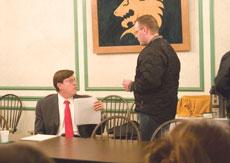Leon stands up Senate

Richard McCallum, vice president for academic affairs, and John Carr, Student Senate president, talk after the Student Senate meeting.
A family emergency for University President Julio Leon cancelled plans for Student Senate to have a long-anticipated question and answer session with León Wednesday.
“We were disappointed,” said Ivia Nastasa, junior finance/economics major. “We’ve been waiting since last semester for Dr. Leon to show up at one of our meetings. He’s canceled, I’m not sure how many times already. So, it was a little disappointing.”
Despite Leon’s absence, the question and answer session was still held by the Senate. Dr. Richard McCallum came to the meeting with typed responses to the Senate’s questions. The answers came from León and Dr. Terri Agee, vice president for business affairs. Questions ranged from the state of Missouri Southern’s academic integrity to why school wasn’t cancelled when President George W. Bush visited last fall.
The first question asked by the Senate was whether the administration had changed health policies after the tuberculosis situation last fall.
“We are doing our very best to ensure that the policies as well as the procedures provide us with a safe living environment and an environment where we can move about comfortably and feel safe and secure,” McCallum said. “We did everything possible to make the University safe. We worked in full partnership with the health department of Joplin. We also offered opportunity to those who needed piece of mind and wanted to go by the clinic and have the test.”
An issue that the Senate has been passionate about is the ban on smoking within 25 feet of any University building. The Senate asked if the Board of Governors was interested in helping to implement the policy.
“We are willing to work with you to develop and improve procedures,” was Agee’s written response. “One idea that has been proposed is to look at the development of signage, to make communication more clear. If needed, we could start issuing tickets with fines for those who are violating the policies. Our public safety department is interested in working with the Senate on this issue.”
A couple of senators were concerned with the academic integrity of the university, as Missouri Southern accepts approximately 99 percent of its applicants.
“We do admit students at this percentage rate,” said McCallum. “But there is a reason for that. Our Board believes that access to higher education is important. Access and affordability are the two guideposts that they use for our institution.
“The belief is that everyone deserves a chance to go to college, and everyone should have the opportunity to have access to college. And so, you see the balance between admission and tuition. We do have admissions standards. Those standards are part of the application process.”
The reaction to the question and answer session was mixed among the senators.
“Some questions were only answered partially,” said Nastasa. “And some just commented on the issue. I believe the one concerning academic standards or academic integrity wasn’t answered fully. Vice President McCallum did say that we are an open-admission university rather than a selective one, but he really didn’t comment on how that impacts our academic standards in the classroom and how students are influenced by that.”
“I thought it went well,” said Senate secretary Whitney Souza. “I thought he answered the questions directly and I was glad. I thought it was a positive thing. I like, too, that the administrators that weren’t able to come were able to send their answers to us. That was a good gesture to say that our questions were still important.
“I was sometimes frustrated by the questions, which I mentioned during the session. A lot of the students want to keep a low tuition but they want all of these things, they want all of these new buildings, and advertisements and they want improvements. They’re not willing to pay for it.”
Souza wasn’t the only senator pleased with the administration response.
“I think it went better than last year,” said Carolyn White, junior pre-med major. “Some of the answers to the questions we had were very informative and fairly helpful.
I would have liked to get more in-depth with the questions relating to the TB outbreak. I understand that it’s a touchy subject, but there were some areas that still seem a little grey.
“The smoking question was answered very well, and I think we can move forward with that. I think we will make a lot of progress with that in the next few weeks.”
Your donation will support the student journalists of Missouri Southern State University. Your contribution will allow us to purchase equipment and cover our annual website hosting costs.



























